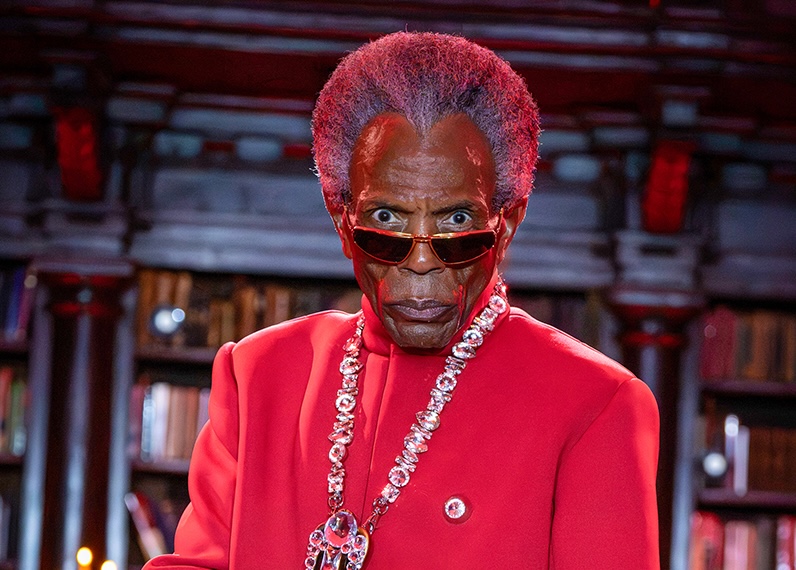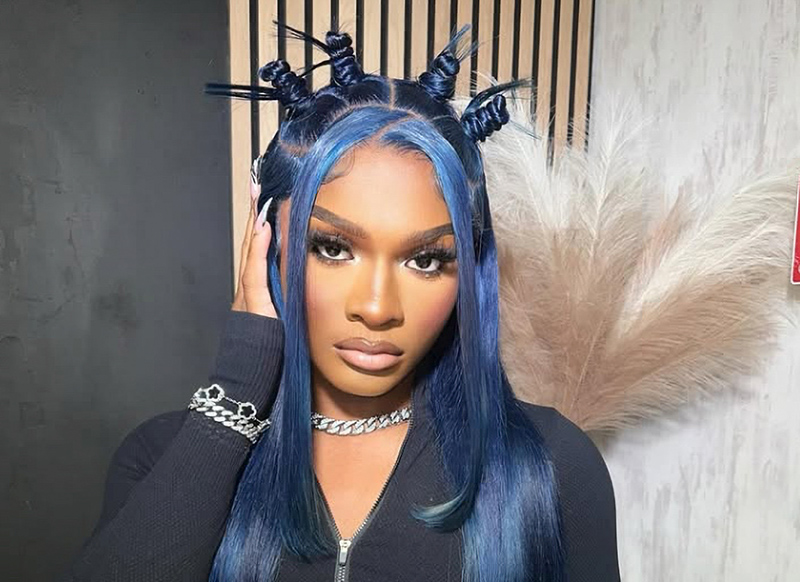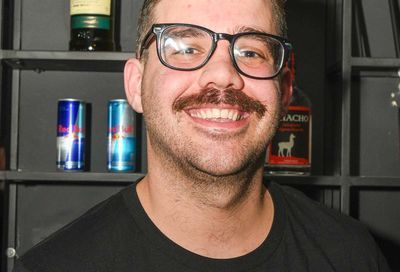Laverne Cox on Netflix doc ‘Disclosure,’ dating in Hollywood, and (begrudgingly) voting for Joe Biden
"Disclosure" magnificently explores trans representation in film and TV, including Cox's groundbreaking OITNB role

Laverne Cox is elated.
“Today is a glorious day!” exclaims the international superstar. “Our film was released worldwide on Netflix. Nothing can bring me down today!”
Not that anyone is trying to. The 48-year-old actor, warm and open in an interview setting, has been through a full day of questioning from reporters, evoking her serious side and igniting her trans-activism mode. She’s blunt about how she views progress in society, and has few qualms about freely expressing her viewpoints. She is, in a word, fearless.
Cox’s Hollywood career began as many do, inauspiciously and tenuously. She had small roles in several obscure films (The Kings of Brooklyn, Bronx Paradise) and snagged appearances on TV procedurals like Law & Order. It wasn’t until 2013, and her heartfelt, devastating portrayal of transgender inmate Sophia Burset on Netflix’s groundbreaking Orange is the New Black, that Cox blasted into cultural orbit. Though never winning, she was nominated for an Emmy three times for her compelling portrayal of a flawed character who, as the seasons progressed, was literally put through hell. Sophia was by no means a perfect person, but Cox’s portrayal of Sophia was about as perfect as it gets.
Cox was not the first transgender actor to achieve fame or acclaim, evidenced in the stunning Netflix documentary Disclosure, on which she served as an Executive Producer. But her stratospheric fame and popularity has afforded her a vital cultural relevance. It’s through Cox — and similar pioneers like Candis Cayne — that the collective voice of the transgender community started to be heard in Hollywood, sparking a seismic, industry-wide change in casting and employment practices and storyline adjustments that, while still not without issues, is at least moving in the right direction.
Masterfully directed by Sam Feder, Disclosure is a gripping testament to how transgender representation has evolved in over 100 years of film and television. Feder has unearthed a treasure trove of clips — some familiar, some obscure — that are revealing, potent, unsettling. The historical narrative put forth frequently shows transgender characters as the butt of a joke or, worse, the recipient of horrific violence. The way a moment pervades the culture — a straight man vomiting at the thought of having kissed a transgender person, for instance — is provided context and illumination. Isolated moments are clustered together to form a sharp, often painful point. Disclosure rivets your attention, and, without shaming your intellect, appeals to it, brilliantly and powerfully.
In just under two hours, the film hits virtually every major touchstone — from popular, iconic LGBTQ treasures like Boys Don’t Cry and Paris is Burning to TV procedurals and the impact of storylines that almost always found the transgender character — often portrayed as a sex worker — murdered.

Disclosure is perhaps most disturbing as it revisits the sensationalist afternoon talk shows of the ’80s and ’90s, with their crude “gotcha” motifs, in which everything was designed to shock and startle the studio audience — the louder the gasp, the better — and participants were reduced to gimmicks. And yet the film also pays tribute to those who made the effort to exhibit personal growth. Celebrities like Oprah Winfrey and Katie Couric, for example, are shown to have learned from past, shudder-worthy interviews with transgender celebrities. Pathways to enlightenment, the film appears to be saying, are paved with mistakes. And if growth is exhibited, then the mistakes are often forgiven, though not forgotten.
Feder smartly intercuts the clips — and there are an exhaustive number, some dating as far back as 1904 — with commentary from transgender actors, writers, and directors from the film and television industry, including Cox, director Yance Ford, writer Jen Richards, Chaz Bono, and the notoriously interview-shy Lilly Wachowski, co-director of the Matrix Trilogy. Few documentaries of this kind achieve the depth of purpose that Feder manages, and fewer still make their points in ways that pierce the viewer’s heart in a lasting, emotional way. The movie is critical of early attempts to portray transgender characters, and yet it’s meant to open up lines of communication so that, moving forward, change can occur both in society and the filmmaking industry. As Yance Ford so eloquently puts it, “I cannot be in the world until I see that I am in the world.”
“Trying to get a film like Disclosure made that looks at the lives of trans people was really hard,” says Cox. “No one’s ever done anything like Disclosure.”
“It was so hard,” echoes Feder. “We had the most diverse fundraising strategy possible, everything from house parties to foundation grants, to investors, and it was brutal. Even selling the film up until just a couple months ago, we were being told from distributors that they already had a trans movie and they didn’t need another. And that they had something that was similar to this. But there’s nothing similar to this. The depth of transphobia was overt every step of the way. It was not lost on any of us. But here we are.”
The film premiered at Sundance on January 27, 2020, to critical acclaim and was on a trajectory that would likely find modest theatrical success, including a potential pathway to the Oscars. And then, of course, COVID-19 put a stop to everything.
“We were devastated to walk away from all the film festivals that we had lined up after Sundance because of the pandemic,” says Feder. “It was really rough. Personally, Tribeca was going to be my homecoming. But here we are with this global platform at Netflix and it’s thrilling. So at least we got here.”
These days, Cox feels omnipresent, from appearances at numerous online Pride events this past June, to appearing in a recent TV spot for Smirnoff that coyly promotes the country’s current stay-at-home vibe. Like the rest of us, she is waiting for the pandemic to pass and for life to resume.
“My life is completely different than it was,” she says when asked how things changed after her star rose during Orange is the New Black‘s run. “I’m even more spiritual because I have had to be. I’ve had to lean into spirituality and self-care in a new way because my life has gotten so big. But representing a marginalized community has been an awesome responsibility.
“What I feel good about is having a twin brother — that helps me remind myself of who I am. And my brother says that I’m still me. I haven’t really changed. He says that when I transitioned I was still the same person. It’s lovely to be able to have someone who’s been there literally your whole life say, ‘Oh you’re the same person.’ But I think I’m more myself now.”
METRO WEEKLY: How did you get involved with Disclosure as one of its primary executive producers?
LAVERNE COX: Sam Feder, the director, had been doing research for two years before I met him. He was giving a presentation on his research at Outfest about three years ago, and I happened to be in the audience that day. A few weeks earlier, I had been talking to my manager about what I wanted to do next in terms of my advocacy. I had always wanted to do a film that looked at the history of how trans folks are represented on screen. When I met Sam, it was just kind of like, “Oh, my god!” I asked if I could get involved, and he said yes.
MW: I was really impressed by the construct of the film in that it intersperses very powerful clips from shows and movies, sometimes in a revealing cluster, with reactions and recollections from prominent transgender members in the film and television industry. It’s very powerful.
COX: Sam’s idea was to have the film be constructed through the memories of trans people, through our memories in relationship to media. Media is the first time where many of us saw ourselves. So it’s really about trans memory. Obviously, once we discovered all this beautiful footage from the early days of cinema, we knew that had to be incorporated as well.
MW: The footage from the early 1900s is truly incredible. I had no idea any of that existed. Sam’s approach also changes the way we view contemporary LGBTQ classics, movies like The Crying Game and Paris is Burning, for example. It takes these movies that we cherish as iconic and kind of flips the message to make a point. It’s a very empathetic approach for someone who is not transgender. But the question then becomes, how are we supposed to view films like The Crying Game after we’ve seen it through this different, potentially upsetting prism?
COX: What Sam and I want to be really clear about is that we are not into discarding films. We are not into canceling films or not showing them. We are into the conversation. We are into loving the films critically, but not into canceling them.

MW: You do specifically say in Disclosure at one point, “I can be critical of Paris is Burning but be happy that Paris is Burning exists.“
COX: I mean, Paris is Burning is such a necessary film. But when you hear from the participants how they felt about it, I think that’s an important component of the story as well.
MW: The series you were on, Orange is the New Black, is referenced as a watershed moment — a big turning point for transgender representation in media.
Cox: There were so many brilliant things about Orange — and I’m biased, of course. [Laughs.] We deeply humanized everyone in the show, people who had been discarded by society, people who are incarcerated. My character, Sophia, was deeply humanized. I think the closest thing before Orange is the New Black for me was Carmelita on Dirty Sexy Money. She was Billy Baldwin’s mistress, and Candis Cayne [who played her] was so radiant. And [Carmelita] was murdered. She was killed off.
But I think part of the difference is what it means to have trans people play trans characters. I think that begins to shift how we see representation because of who is playing the role. Trans people playing trans characters is really important in the trajectory of us trans folks being seen in television and film.
MW: If Sophia had been played by a cis actor, I don’t think she would have had the same impact. Which calls up the big question: should cis gender actors still be playing transgender characters at all? Several prominent actors have argued that the rule should be the best actor for the part, the compromise being that transgender actors should also be considered, as well as be offered more cis roles. How do you respond to that?
COX: I have always felt that I wouldn’t want to tell an artist that they can’t play something, because I’ve been told I can’t play something my whole life. But what we know now at this historical moment in 2020, according to GLAAD, is that 80 percent of Americans report not personally knowing someone trans. Most of what they learn about trans people comes from the media. If we have non-trans people or cis people playing trans roles, how does that affect the lives of real-life trans people at this historic moment?
What I implore the artist to do is to consider that. I wouldn’t tell them to not play something, but I would invite them to consider [writer] Jen Richards’s argument that when cis men specifically play trans women, that sends a message that trans women are really men, and that then leads to violence against trans people. So there is something very compelling about her argument that I would invite a [cis] artist to consider when thinking about playing a trans person. I mean, actors losing jobs? I get it. But I would invite an artist to just have the information. And I think what Disclosure provides is the information. Artists need to be free to express themselves, but I would like them to just have all the information when they make their choices.

MW: One thing the film does masterfully is point out that we didn’t have the language for the transgender community, even as early as twenty years ago. The movie coaxes out the fact that society has finally started to provide words that define and better elucidate what it means to be transgender, what it means to be trans masculine.
COX: “Language is also a place of struggle,” as bell hooks writes in Yearning. You have to be able to name something. And the language is always a place where there’s limitation as well. Being concise with language is really important and crucial. Naming something can reduce it from its complexity.
What I know for sure in my own life is that when I finally claimed being trans, it was a relief. Because my whole life I had been struggling with being trans and being feminine and not wanting to have a label. And then, when I just claimed being trans, I found it very freeing. Now, this is just my story. Not everyone feels the same way about language and claiming a word, but language gives me such a sense of clarity. And being precise with language gives me a sense of groundedness.
I was literally thinking about what Marquise Vilson said about being erased from the ballroom community — it was one of the things he addresses in our film. He said, “We were there, but there just was no language for it.” Needing to have words wrapped around you so that people know that you existed — it’s really that piece that we need: To be able to name it so we don’t erase people, so we don’t discount people.
This is the year of the 2020 Census — I’m very tangential in my thinking — and we don’t count LGBTQI people in our census in the United States! There was a push for it, and then [the Trump administration] came into power and all the momentum for the LGBTQ Data Inclusion Act just went away. When you aren’t counted, you can very well be discounted. So language is a way to make sure everyone is counted and to hopefully not misrecognize people or misidentify them.
MW: We first interviewed you in 2013, when Orange is the New Black premiered. Metro Weekly was, in fact, your very first cover. Do you remember?
COX: [Laughs.] Oh, I remember! I think everyone remembers their first magazine cover.

MW: So much has happened with your career and your life since. How has your life changed since becoming an internationally recognized celebrity?
COX: I am living my dream. This is exactly what I’ve always dreamed of. Has it unfolded the way I thought it would? Not quite. I don’t know if anyone knows how much work it is. I don’t know if people know how much pressure it is, dealing with being misquoted by journalists, having your words taken out of context, attempts to cancel you, being dragged on Twitter, and the transphobia that exists when you are one of the most famous trans people in the world. It’s a lot. It’s been a lot. But there is so much love — I mean I could cry thinking about how much love I have from fans and followers, how much love there is out there. It is so beautifully healing.
Even through this coronavirus moment, I’ve had moments when I’ve gone live — I live alone, I’m single — and just going on [social media] and getting love from fans — well, your fans can really lift you up. They can give you strength on a bad day, through a breakup, and through all the things that life throws at you. I’m not complaining. I’m not complaining for a second. I am so grateful that I have been chosen in this way.
I think the interesting thing about my life too is that I am aware that things happen in God’s time, not my time, but all this happened after I turned 40. I am now 48 years old. I turned 40 and my whole life changed into this, and I understand now that I’ve been chosen for something that was bigger than me. I’m trying to lean into the joy of that, lean into the “Thank you so much for choosing me,” and my prayers to my higher power has been like, “The weight of it is too much. Please God, Lord Father, I want to be able to do this with a sense of lightness and without stress.” That has been my prayer, and that’s how I’ve been going about things this year. It’s been pretty glorious.
MW: You mentioned transphobia. What kind of transphobia do you continue to encounter?
COX: It’s different. It’s complicated. When you are famous, I’ve learned, it erases a lot of things. Fame becomes a sort of great equalizer in this culture that worships celebrity. A lot of things that other black trans women are going through on a daily basis, I don’t go through because I’m famous, and I’m privileged enough to be able to shield myself from certain everyday realities. That’s real.
I remember one time Essence posted a photo of me in jeans and they were like, “No one’s ever looked better in a pair of jeans.” Essence has been so incredibly supportive of me and my work — I love Essence magazine so much. But the comments section was so deeply transphobic. There were so many people misgendering me. It was vicious. But there was also a lot of love, and I focus on the love.
Still, I’m aware that there is vicious transphobia towards me from certain people online on other sites. I’m concerned about how that might affect people who are more marginalized than I am and are more at risk. That is a reality.

MW: What is your dating life like?
COX: In dating, I don’t know if I was really surprised. I think I had a fantasy of, “Okay, I’m going to be successful and the right man will come along.” I’ve had two boyfriends back-to-back in the past several years. Now, I’ve been single for a year, and the men in my industry don’t approach me. When I go to events, men don’t approach me. When I go to work events, I’m in work mode, so I’m not really even thinking about that, I just notice that men in my industry that are in my day-to-day life don’t approach me. I’m on dating apps, and there’s so many men in the industry who I know secretly date trans women. We know who a lot of them are, we know who a lot of them are.
And that’s fine. That’s their business. It’s nobody else’s business. But it’s interesting that it needs to remain a secret. And all the men who are secretly dating and sleeping with trans women in our business, they will never approach me, because they don’t want anyone to know. So it’s hard. It’s still hard dating. It’s hard as it was when I wasn’t famous.
MW: Disclosure certainly speaks to and helps to validate viewpoints and feelings within the transgender community. But do you think it has the power to change hearts and minds beyond the transgender community?
COX: I absolutely hope so. That is always my goal as an artist. Brené Brown says stories are data with a soul, and it’s really hard to hear personal stories of all the folks we interviewed and not be touched and moved by them. I don’t care who you are. But I think time will tell. We can’t predict the future, but I believe it’s possible, absolutely.
MW: What is your wish for the LGBT community overall?
COX: Collectively, I think there’s a lot of work still to be done. But the evolution has been really beautiful. The evolution has been a lot of activism. I feel a lot of transphobia within the LGBTQI community has gotten so much better. I think we’ve all seen a shift, over the past several years, but there’s still a lot of transphobia and there’s a lot of racism. There’s a lot of racism in classes within the LGBTQI community in the ways in which we reside in the realm of sexual desire. I think some of the racism, the way it plays itself out there, is abhorrent. It’s absolutely abhorrent.
When I hear from my black gay male brothers about how they’re being treated by some white gay men — and this is my empirical data, but I just spoke to a black gay man recently about this. He was telling me how he had had a really negative experience with a white man that was really racist. It wasn’t that the white man didn’t want to date him. It’s that he did want to date him, but in a very fetishistic, racially-charged way. I said to him, “You know, I have been hearing from a lot of my gay black male friends that this is something that is rampant,” and he had never talked to anybody about it. I think he had shame about it, and he didn’t even realize that other people are going through this.
The way in which race is playing itself out in sexual practice in the LGBTQI community needs to be talked about in a way that’s not salacious, but in a way that’s responsible. I mean, we desire what we desire, but what’s going on when we need to say the “N-word” to people during sex unconsensually? That’s a problem. Apparently, according to what I’m hearing, this is happening all over the country, and that’s disturbing.
Also, the LGBTQI community really has to have working and poor people in mind if we want to evolve as a movement that is really in a coalition with other movements. I think we need to really be in collaboration with working class folks. How does the movement change, right? Because so much of the focus feels like when you think about mainstream LGBTQI+ communities, it’s so white and monied.
Obviously, everybody doesn’t have money, but there’s just this perception. So what does it mean for the powerful people within our community to begin to think about poor working people and have the movement be in coalition with making sure the material conditions of working class people have changed in this country. I think that, especially as we gain rights as a community — which is happening — we have to have relevance beyond just ourselves once we get ours, you know? So there’s that.

MW: Narrowing it down, what is your wish for the transgender community apart from the rest of the LGBTQ community?
COX: For trans people, I think it’s really about us being more integrated into every aspect of society and to be able to be openly ourselves. There should be more representations and more stories about us, particularly in films. We’ve made a lot of progress in television, but not as much in film, people playing trans characters and non-trans characters.
Then, again, the material conditions of those folks in our community who are most at risk being changed, and that’s about our society-at-large. It’s about our politics. It’s about how we finance our elections. It’s about who the people in Washington and all of our state capitals are working for — and it’s usually not for working class people. I think the revolution for me around most all of these sorts of identity questions needs to be in coalition with working people, because we have to change the material conditions of people. There are too many people who are struggling. We’re all in this together and we all have a stake in everyone being lifted up.
MW: I think we should all work on getting rid of the president. That’s just my opinion.
COX: He’s just a symptom, though. This was going on beforehand. But I think he’s exposed a lot of the problems. I’m going to say it publicly: I’m going to vote for Joe Biden — begrudgingly, though. I’m begrudgingly voting for him. I’m not excited. I think that the corporate nature of the Democratic Party is deeply problematic. I was a registered independent until this year. I don’t usually talk in these terms, because it alienates a lot of people, but I am so emboldened by the protestors in the streets right now that I feel like I need to just tell the truth.
Democrats and Republicans have been bought off by special interests and corporations, and they’re not working for everyday people. Joe Biden epitomizes that, and then there are other issues, too…. I think the truth is, yes, the president of the United States has got to go — there’s just so many problems there that everybody knows. Everybody awake knows those problems. I think the bigger issue is that what has been presented to us as an alternative — what’s consistently presented to us as an alternative — is not great, in my opinion.
But I’m voting for Joe Biden. Trust, I’m voting for him — and I think his history on policing and the crime bill is deeply problematic. Just the corporate nature of how he’s done politics for 50 years is a problem. Anyway….
MW: We’re seeing more and more transgender people win political office throughout the country. Do you ever envision a day where we’ll have a transgender person as our president?
COX: No one’s ever asked me that — good for you. I hope so. I mean, I think it’ll depend on the candidate. I think Barack Obama is so exceptional on so many different levels, that it wasn’t even about black or white with him, he was just so…. the political savvy and charisma and intelligence and just everything. So I would say it would depend on the candidate and what they bring to the table. But quite possibly, yes. I’d like to think anything is possible in the United States of America.
Disclosure is streaming exclusively on Netflix. Visit www.netflix.com.
Support Metro Weekly’s Journalism
These are challenging times for news organizations. And yet it’s crucial we stay active and provide vital resources and information to both our local readers and the world. So won’t you please take a moment and consider supporting Metro Weekly with a membership? For as little as $5 a month, you can help ensure Metro Weekly magazine and MetroWeekly.com remain free, viable resources as we provide the best, most diverse, culturally-resonant LGBTQ coverage in both the D.C. region and around the world. Memberships come with exclusive perks and discounts, your own personal digital delivery of each week’s magazine (and an archive), access to our Member's Lounge when it launches this fall, and exclusive members-only items like Metro Weekly Membership Mugs and Tote Bags! Check out all our membership levels here and please join us today!



























You must be logged in to post a comment.